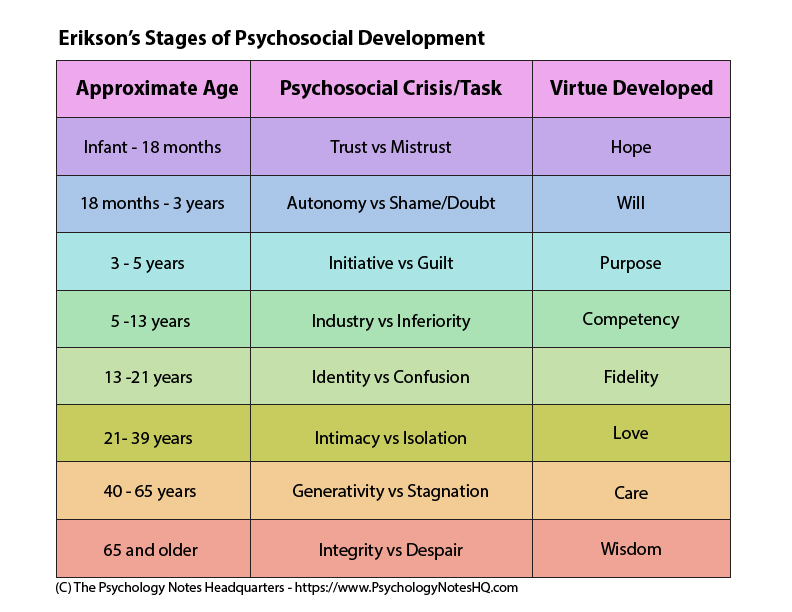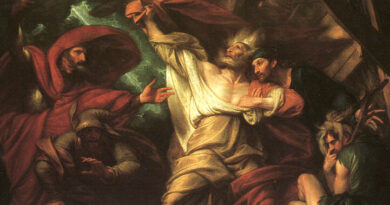Erikson’s 8 Stages of Psychosocial Development

Erikson’s stages of psychosocial development describe 8 different developmental stages that an individual must pass through in order to become a healthy human. The stages start from infancy and go into late adulthood. During each one of these stages a person must confront and hopefully master the challenge being presented to them. However each stage builds on the successful completion of the prior stage. If a challenge during one of the stages is not successfully completed it may reappear as a problem in the future, however there are certain virtues associated with each stage. (Funder, 2011)
In the book Personality Puzzle by Funder, he described all of the different stages of Erikson’s psychosocial development. The first stage he describes is Trust vs. Mistrust (birth to 18 months), during this stage children learn to develop a sense of trust when their caregivers are reliable, caring and affectionate. The virtue learned is hope but if the stage was not done successfully can lead to mistrust. The second stage of autonomy vs. shame and doubt revolves around toilet training (2-3yrs), children during this stage must develop a personal control over physical skills and a sense of independence. The virtue the children learn is will. The third stage is initiative vs. Guilt (3-5yrs), during this stage the children must learn how to exert power and control their environment. If they exert too much power they can experience disapproval resulting in a sense of guilt, however completing this stage successfully can result in a sense of purpose. The fourth stage of industry vs. inferiority (6-12yrs), deals with children learning how to cope with new social and academic demands. The virtue learned is competence but if the stage is not completed successfully can lead to feelings of inferiority.

The next four stages take place from the teenage years to late adulthood. Starting with the fifth stage of Identity vs. Role Confusion (13-19yrs), the teenager now struggles to develop a sense of self and their identity. The virtue learn in this stage is fidelity, to one’s self. Intimacy vs. Isolation is Erikson’s 6th stage and it takes place during early adulthood (20-40yrs). At this time people need to form intimate and loving relationships with others. If not completed successfully can lead to isolation however if challenge is overcome the virtue learned is love. The next stage takes place during middle adulthood (40-65yrs), this stage is called Generativity vs. Stagnation. During this stage adults feel the need to create/nurture something that will outlast them. A way of achieving this is often by having children or creating something that they believe can benefit others. The virtue associated with this stage is care. The last stage of Erikson’s psychosocial development is Ego Integrity vs. Despair, the virtue associated with this stage is wisdom. People at this stage of their lives look back and try to feel a sense of fulfillment, like their lives actually mattered.
In the Tv show Once upon a Time created by Adam Horowitz and Edward Kitsis there is a character called Emma. The show is about fairy tale characters who got cursed by the evil queen sending them to our world. Emma is the daughter of Snow White and Prince Charming, but the day of her birth is the same day the evil queen casted the curse. To protect Emma and save the characters from the curse, Emma was sent through a magic wardrobe to a land where the curse would not affect her, our world. (Adam & Edward, 2011)
Having escaped from the curse, Emma grew up in an orphanage and didn’t have the nurture she from her mother as an infant. Being taken care of as a baby is what Erikson believes to be the most important thing in his Trust vs. Mistrust stage. Although we don’t see Emma as a child, we find out throughout the show about her childhood and the lack of nurture she had in the orphanage. We first meet Emma on her 28th bday when her son Henry, who she gave up for adoption at birth, shows up at her door. As she tries to return Henry to his current mother, Henry tells her about the curse and how Emma is the only person who can break it. This is the first time we see her mistrust issue. During every episode Henry tells her about new a new thing that happened in the fairytale land she’s from, however Emma does not want to believe it, even though there are signs that proof otherwise. A sign can be like the clock in the town started telling time when Emma decided to stay in Storybrooke, or her not being able to see that Pinocchio was turning back to wood. (Adam & Edward, 2011)
A few examples of Emma dealing with mistrust issues are when Emma is with her mother, Snow White who is called Mary Margaret in our world. When Emma first moves in with her, she didn’t believe that someone could be genuinely nice to her, she believed there was something that Mary Margaret wanted, when in reality all Mary Margaret wanted was to be her friend. Due to an accident both Mary Margaret and Emma, who now know they are mother and daughter, were both transported back to the Fairytale world they are originally from. Snow white fought off an ogre in order to save Emma, and Emma tells her that she’s not used to being helped, and doesn’t understand why Snow did it, snow tells her that it’s because she’s her daughter. When they reach Snow’s castle, Emma sees the room that was supposed to be hers and wonders why Snow would give it all up, and understands that it’s because of the love that Snow has for her. Although she kind of now trusts Snow, she doesn’t trust Mulan or any other character that comes near her. This goes to show that the lack of nurture during her childhood lead her to be very independent and only trust in herself to get things done. She does not like relying on other people, and does not believe that others will actually do what they need to do.
References
Funder, D. C. (2011). The personality puzzle. (5 ed., pp. 447 – 449). New York: W W Norton & Co Inc.
Adam, E. (), & Horowitz, K. () (2011). Retrieved from http://beta.abc.go.com/shows/once-upon-a-time/about-the-show




